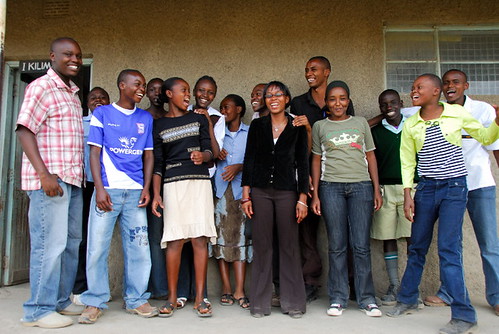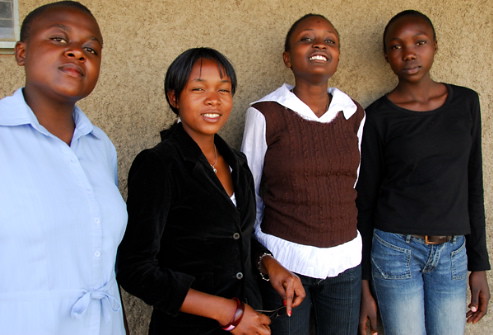Now I’ve returned to where we should be: nearly in the present. We visited Nakuru and the mentors before the IDP camp, so this is the last out-of-order set of entries. The dates we were in Nakuru: July 1oth-13th (the IDP camp was the 13-17th).
 Photo: Kate Cummings. Location: Nakuru, Kenya. Partner: Vital Voices
Photo: Kate Cummings. Location: Nakuru, Kenya. Partner: Vital Voices
Mentees and mentors from Nakuru gathered at Flamingo Primary School, ready to tell us their stories. During one-on-one interviews with each of them, we learned how important Ripe for Harvest’s mentoring program had been for the mentees – and how much the experience had changed the mentors. Here are a few of their stories:
Mentees:
 Photo: Kate Cummings. Location: Nakuru, Kenya. Partner: Vital Voices
Photo: Kate Cummings. Location: Nakuru, Kenya. Partner: Vital Voices
Diane Chivadika – 14 (blue shirt in picture, far left)
Becky Chelimo – 14 years old (second from right)
Edith Akoth – 15 (far right)
Edith’s sister, Sarah, offered to mentor her and asked that she recruit a couple of her friends as mentees. Edith chose her best friends Diane and Becky, and the three of them would meet with Sarah every week, going on hikes together or enjoying ice cream in town. Individually, the girls were nearly silent – together, the giggles and conversation didn’t stop. Starting and finishing each other’s sentences, they told me about having Sarah as a mentor:
At first, we didn’t understand what mentoring was all about. But after Sarah explained to us, we would talk to her about our lives. Sometimes parents can’t understand like Sarah can. We like to talk to her – yeah, we really like it! [-others chime in] When you keep problems to yourself, it can affect your studies. When you have someone to talk to, you feel better. Some of the problems Sarah helps us with? Boys, other students saying bad things about us because of what tribe we belong to. Some of the boys at our school are doing drugs, and she talks to us about that. Sarah helps us refocus on our studies.
 Photo: Kate Cummings. Location: Nakuru, Kenya. Partner: Vital Voices
Photo: Kate Cummings. Location: Nakuru, Kenya. Partner: Vital Voices
Gerishon Muraya – 13 years old (on right, in blue)
When Gerishon and his mentor, Ishmael were together, they were always laughing. They ran across the school field, chasing each other and rolling into a pile on the ground like brothers. During group activities, Gerishon would keep his eyes on Ishmael, and drew noticeable confidence from the way his mentor led other students and made everyone welcome. Gerishon told me in our interview how the mentoring has affected him:
You are free with Ishmael and he can consult with you. Even in my classes, it has changed my studies. He tells me how to handle my problems. Even at home, I feel better. My relationship with my parents is better – we used to have quarrels all the time. When we started the mentoring, it wasn’t easy – we had to get to know each other. But now, my performance is better. I want to continue seeing Ishmael – he has clearly been nice to me.
Mentors:
 Photo: Kate Cummings. Location: Nakuru, Kenya. Partner: Vital Voices
Photo: Kate Cummings. Location: Nakuru, Kenya. Partner: Vital Voices
Sarah Atieno Otieno – 22 years old
Sarah is the eldest child of five, and is in her third year of college as a communications and technology major. She loves singing at church and cooking pancakes for her family. Sarah went above and beyond with her mentors – finding ways to take them out on every meeting, buying them snacks with her own money, and even encouraging girls to reflect on the challenges that young women in Kenya face (they each wrote a paper on the topic and shared it with Sarah). Here she shares about her experience mentoring her sister and her friends:
It was challenging at first to mentor my own sister, but she opens up more in the group with her friends. All of the girls are more able to open up with me now, after some time together. We talk about challenges in school, discrimination from other students, boy and girl stuff. I like to take the girls on outings when we get together – it breaks the tension. We go hiking a lot. How has mentoring changed me? It opens up my mind. You have to be ready for the mentors – if they have problems I don’t know about, I have to research, to talk with other mentors, so I can learn how to help. With more training, we could do better. If the mentors could meet more often, we could share what we go through and support each other. I’d like more training in how to be creative as a mentor – like other techniques I could use, or how to help mentees with their difficulties. We [as mentors] need to be able to address questions skillfully so the mentee feels empowered. I want to teach my girls how to avoid being manipulated by young men. If we could get more funding to take our mentees on outings and have snacks for them, I could do more; right now, I am using my own money. Do I want to continue mentoring them? Oh yes, definitely.
 Photo: Kate Cummings. Location: Nakuru, Kenya. Partner: Vital Voices
Photo: Kate Cummings. Location: Nakuru, Kenya. Partner: Vital Voices
Ishmael Kingori – 22 years old
Ishmael is gregarious, quick to lead in a group and immediately comfortable around younger people. He is a business of commerce college student, close to finishing his degree. I asked him about his meetings with his mentee, Gerishon:
In the first meetings, the process of mentoring was still forming in my mind. But I had a feeling from within about mentoring. Sometimes we talk about drugs – he is just in 8th grade, but he feels a lot of peer pressure. One of my mentees is often sent by his uncle to buy alcohol for him. I advised him to do what he’s sent to do but to know himself. I’ve changed because now I have someone to help out. I have a role to play, and I know there is more to life. Do I want to continue mentoring? I can’t leave at this stage. I know this boy is going to high school, and he will be in need because he’ll have things to share about how he’s expected to be in life. This is a passion, you take it seriously – and to be our best, we need more training. Some topics are challenging to talk about, especially drug issues and one how mentees should compose themselves. Mentors also need a mentor to talk to during the training, and during our time with mentees.
Posted By Kate Cummings
Posted Jul 31st, 2009


345 Comments
Melysa
August 2, 2009
Great profiles, Kate. I agree with Abby that this age is such a critical time in a young person’s life. It sounds like both the mentors and the mentees are really tapping into the potential of their relationship. And, of course, your photos are gorgeous! I hope you as having as much fun as the photos seem to convey.